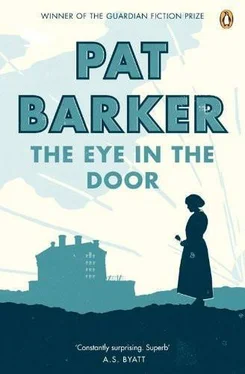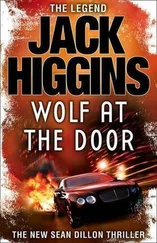Siegfried was sitting up in bed, pyjama jacket off, face and chest gleaming with sweat. ‘Is it hot, Rivers?’ he asked, as if their conversation had never been interrupted. ‘Or is it just me?’
‘Warm.’
‘I’m boiling . I’ve been sitting here simmering like a kettle.’
Rivers sat down beside the bed.
‘I’ve been writing to Graves. In verse. Do you want to read it?’
Rivers took the notepad and found himself reading an account of his visit that afternoon. The pain was so intense that for a moment he had to keep quite still. ‘Is that how you see me?’ he said at last. ‘Somebody who’s going to make you go back to France till you break down altogether?’
‘Yes,’ Sassoon said cheerfully. ‘But that’s all right, I want you to. You’re my external conscience, Rivers, my father confessor. You can’t let me down now, you’ve got to make me go back.’
Rivers read the poem again. ‘You shouldn’t send this.’
‘Why not? It took me ages. Oh, I know what it is, you don’t think I should say all that about the lovely soldier lads. Well, they are lovely. You think Graves is going to be shocked. Frankly, Rivers, I don’t care; shocking Graves is one of my few remaining pleasures. I wrote to him — not to shock him — just an ordinary letter, only I made the mistake of talking with enthusiasm about training in one paragraph, and in the next paragraph I said what a bloody awful business the war was, and what do I get back? A lecture on consistency, oh, and some very pathetic reproaches about not terrifying your friends by pretending to be mad, I thought that was particularly rich. I’ve done one totally consistent, totally sane thing in my life, and that was to protest against the war. And who stopped me?’
Graves, Rivers thought. But not only Graves. It was true, he saw it now, perhaps more clearly than he had at the time, that whatever the public meaning of Siegfried’s protest, its private meaning was derived from a striving for consistency, for singleness of being in a man whose internal divisions had been dangerously deepened by the war.
‘You mustn’t blame Graves. He did what —’
‘I don’t blame him, I’m just not prepared to be lectured by him. I survive out there by being two people, sometimes I even manage to be both of them in one evening. You know, I’ll be sitting with Stiffy and Jowett — Jowett is beautiful — and I’ll start talking about wanting to go and fight, and I’ll get them all fired up and banging the table and saying, yes, enough of training, time to get stuck in to the real thing. And then I leave them and go to my room and think how young they are. Nineteen, Rivers. Nineteen . And they’ve no bloody idea. Oh, God, I hope they live.’
Suddenly, he started to cry. Wiping the back of his hand across his mouth, he sniffed and said, ‘Sorry.’
‘That’s all right.’
‘You know what finally put the kibosh on my Jekyll and Hyde performance, no, listen, this is funny. I got a new second in command. Pinto. Absolute jewel. But the first time I met him he was reading Counter-Attack , and he looked up and said, “Are you the same Sassoon?” My God, Rivers, what a bloody question. But of course I said, “Yes.” What else could I say? And yet do you know I think that’s when things started to unravel.’ A marked change in tone. ‘It was when I faced up to how bloody stupid it was.’
Rivers looked puzzled. ‘What was?’
‘My pathetic little formula for getting myself back to France.’ He adopted a mincing, effeminate tone. ‘“I’m not going back to kill people. I’m only going back to look after some men.”’ His own voice. ‘Why didn’t you kick me in the head, Rivers? Why didn’t you put me out of my misery?’
Rivers made himself answer. ‘Because I was afraid if you started thinking about that, you wouldn’t go back at all.’
He might as well not have spoken. ‘You’ve only got to read the training manual. “A commander must demand the impossible and not think of sparing his men. Those who fall out must be left behind and must no more stop the pursuit than casualties stopped the assault.” That’s it. Expendable, interchangeable units. That’s what I went back to “ look after ”.’ A pause. ‘All I wanted was to see them through their first tour of duty and I couldn’t even do that.’
‘Pinto’s there,’ Rivers said tentatively.
‘Oh, yes, and he’s good. He’s really good.’
Siegfried’s face and neck were running with sweat. ‘Shall I open the window?’ Rivers asked.
‘Please. They keep shutting it, I don’t know why.’
Rivers went to open the window. Behind him, Siegfried said, ‘I’m sorry you don’t like my lovely soldier lads.’
‘I didn’t say I didn’t like them. I said you shouldn’t send them.’
‘There was one in particular.’
‘Jowett,’ said Rivers.
‘I wrote a poem about Jowett. Not that he’ll ever know. He was asleep. He looked as if he were dead.’ A silence. ‘It’s odd, isn’t it, how one can feel fatherly towards somebody, I mean, genuinely fatherly, not exploiting the situation or even being tempted to, and yet there’s this other current. And I don’t think one invalidates the other. I think it’s perfectly possible for them both to be genuine.’
‘Yes,’ said Rivers, with the merest hint of dryness, ‘I imagine so.’ He came back to the bed. ‘You say things “started to unravel”?’
‘Yes, because I’d always coped with the situation by blocking out the killing side, cutting it off, and then suddenly one’s brought face to face with the fact that, no, actually there’s only one person there and that person is a potential killer of Huns. That’s what our CO used to call us. It had a very strange effect. I mean, I went out on patrol, that sort of thing, but I’ve always done that, I’ve never been able to sit in a trench, it’s not courage, I just can’t do it, but this time it was different because I wasn’t going out to kill or even to test my nerve, though that did come into it. I just wanted to see . I wanted to see the other side. I used to spend a lot of time looking through the periscope. It was a cornfield. Farmland. Sometimes you’d see a column of smoke coming up from the German lines, but quite often you’d see nothing.’ A pause, then he said casually, ‘I went across once. Dropped down into the trench and walked along, and there were four Germans standing by a machinegun. One of them turned round and saw me.’
‘What happened?’
‘Nothing. We just looked at each other. Then he decided he ought to tell his friends. And I decided it was time to leave.’
A tense silence.
‘I suppose I should have killed him,’ Siegfried said.
‘He should certainly have killed you.’
‘He had the excuse of surprise. You know, Rivers, it’s no good encouraging people to know themselves and… face up to their emotions, because out there they’re better off not having any. If people are going to have to kill, they need to be brought up to expect to have to do it. They need to be trained not to care because if you don’t…” Siegfried gripped Rivers’s hand so tightly that his face clenched with the effort of concealing his pain. ‘It’s too cruel.’
Rivers had been with Siegfried for over an hour and so far nothing had been said that might not equally well have been dealt with at some more convenient time of day. But now, his excitement began to increase, words tripped him up, his mind stumbled along in the wake of his ideas, trying desperately to catch up. He spoke of the vastness of the war, of the impossibility of one mind encompassing it all. Again and again he spoke of the need to train boys to kill; from earliest childhood, he said, they must be taught to expect nothing else and they must never never be allowed to question what lies ahead. All this was mixed in with his anxieties about the raid Jowett and the others were going on. He spoke so vividly and with so much detail that at times he clearly believed himself to be in France.
Читать дальше












